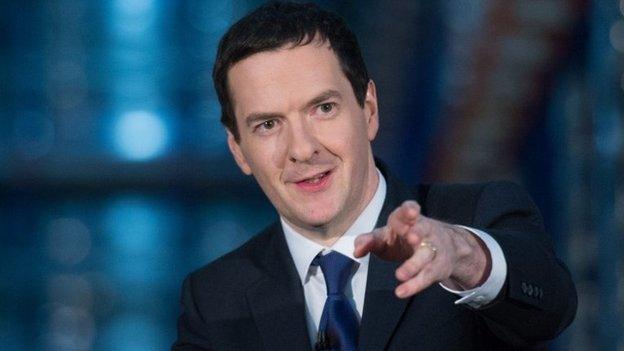Osborne faces up to productivity challenge
- Published
- comments

As a hack who has seen eight chancellors come and go since first taking a professional interest in the stewardship of the economy, it is slightly tempting to yawn and ignore George Osborne's claim tonight that he will put boosting productivity at the forefront of his policies.
If I were cynical I would say that it is a shame that the so-called productivity challenge hardly featured in the general election battle.
Or I might point out that successive governments and chancellors have vowed to improve the UK's internationally sub-standard productivity, to very little effect.
But I am minded to say that Osborne's focus on productivity tonight at the CBI dinner matters, not least because it represents an important shift of emphasis at the Treasury - towards an agenda for economic growth, rather than the almost exclusive focus of the previous coalition government on reducing the large deficit between public sector revenues and outgoings.
However, just to be clear, there is no hint from the Chancellor of any backing away from very substantial welfare and ministerial cuts in his exceptional looming budget.
'Flatlining'
There are a few points to make about what most economists will see as a belated statement of the bleedin' obvious by the Chancellor, namely that "improving the productivity of our country is the route to raising living standards of living for everyone in this country".
First is that he acknowledges that productivity or output per hour worked in the UK cannot be suddenly turned from 30% below US and German levels to parity - or indeed that the unexpected flatlining of productivity since the Crash of 2008, which is the biggest single cause of the flatlining of earnings, will be transformed at a stroke into supra-normal growth.
Thus he told the business leaders of the CBI that the aim was to "ensure higher living standards for the next generation to come".
Or to put it another way, when it comes to productivity, there are no quick fixes.
Second, much of what's required to boost output per hour and per worker requires hard and politically controversial decisions - to, for example, push through new road, rail and housing schemes against nimby opposition.
Osborne implies he's up for the fight, in saying "our physical infrastructure is not nearly good enough, and previous governments ducked the difficult decisions".
Apart from anything else it is typically a matter of shame and regret for British ministers that their habit of denigrating the French economy seems less compelling when French productivity is much higher than British, thanks in part to the higher quality of Gallic infrastructure.
One implication is that as and when Sir Howard Davies's commission recommends there should be a new runway at Heathrow, the Chancellor and prime minister will not back away from approval, even in the face of opposition from Boris Johnson.
Future prosperity
So what else does the Chancellor say we need to do to get productivity moving belatedly in an upward direction? His list is "transport, broadband, planning, skills, ownership, childcare, red-tape, science, innovation, finance".
Not much to do then.
But the acknowledgement that "our future prosperity depends on it [sorting productivity]" will be applauded by the many economists who fear that for years they've been ignored as they bemoaned our productivity failure.
Even so, don't expect the Chancellor to admit that his record in the last parliament was sub-optimal. He insisted: "I do know that I'd much rather have the productivity challenge than the challenge of mass unemployment".
In other words, if to many it looks as though our economy put the cart before the horse, with dramatic falls in unemployment while productivity languished, George Osborne is grateful that employers put recruitment before investment in labour-saving kit.